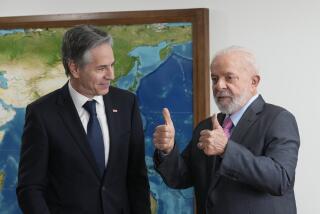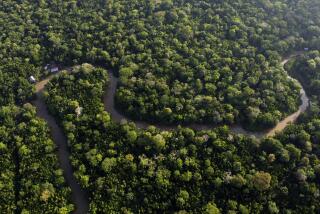New Brazil Leader to Tour Abroad : Visits to U.S., Europe and Latin Nations to Focus on Debt
- Share via
RIO DE JANEIRO — President-elect Tancredo Neves of Brazil makes his international debut this week with a trip to Western Europe, the United States and other Latin American nations. Brazil’s foreign debt figures to be the major issue.
Neves, 74, is a well-known political figure in Brazil, where he has been on the national scene for 40 years, but he is relatively little known abroad. The purpose of his trip, before his inauguration March 15, is to establish personal relations with world leaders.
During the two-week tour, which is to begin Wednesday, he will meet with Pope John Paul II, President Reagan and other top U.S. officials, the prime ministers of Italy and Portugal and two key Latin American presidents, Miguel de la Madrid of Mexico and Raul Alfonsin of Argentina.
Largest Foreign Debt
Neves (pronounced NAY-vehs) will take over the presidency of Brazil after 21 years of military-dominated governments, and this fact figures prominently in Brazil’s future relations with traditional partners in Western Europe and United States. But Brazil also has the largest foreign debt in the Third World, with more than $100 billion owed to banks and governments in Western Europe, the United States and Japan.
The outgoing government of President Joao Baptista Figueiredo has been trying to refinance this debt on longer and easier terms with a steering committee of more than 600 creditor banks. It has also signed a new letter of intent with the International Monetary Fund, establishing conditions for reducing inflation here, which soared last year to 223%.
The negotiations with the banks were interrupted last week in a dispute over how much interest Brazil should pay under a scheme to refinance about $44 billion in debt over a 15-year period.
There are doubts about what conditions the new administration will accept for a new debt agreement. The letter of intent signed in December with the International Monetary Fund, establishing credit and monetary ceilings geared to an inflation rate of 120% this year, are widely viewed here as being unrealistic.
An advisory committee on economic policy set up by Neves has reportedly reached the conclusion that the letter of intent has to be revised. The committee is also considering a new approach to the debt that would limit interest payments, either by deferring payments that exceed a ceiling or by linking debt payment to Brazil’s export surpluses.
Neves is characteristically closemouthed about specific proposals, but he has said that debt payments should not undermine economic recovery here.
“Our debt is paid in money, not in the misery, hunger and unemployment of our people,” he said in a press conference last week.
This is the message that Neves is expected to deliver in Washington in the course of a visit scheduled to take place between Jan. 30 and Feb. 2. Meetings have been scheduled with Reagan, Vice President George Bush and Secretary of State George P. Shultz.
The same message is to be delivered to the European Economic Community in visits with Italian President Sandro Pertini and Prime Minister Bettino Craxi.
As Latin America’s largest and most economically developed country, Brazil, with a population of 130 million, has important economic ties with Western Europe, the United States and Japan. The policies adopted here have a major influence on other Latin American countries.
The visits to Presidents De la Madrid of Mexico and Alfonsin of Argentina are a demonstration by Neves that he will seek to strengthen coordination among the major Latin American countries on issues of common interest. The foreign debt is among the most important of those.
Since these visits will come after his meetings in Washington, Neves will be in a position to assess U.S. response to Brazil’s proposal that the debt be considered a matter for cooperation between creditor and debtor governments--not just as a banking matter.
The Latin American countries have scheduled a meeting in the Dominican Republic on Feb. 8 to continue earlier discussions in Cartagena, Colombia, and Mar del Plata, Argentina, on a coordinated position on debt negotiations.
Neves, who is a devout Roman Catholic, has made the first stop on his trip a visit with the Pope at the Vatican on Thursday, just before he departs on a trip to Venezuela, Ecuador, Peru and Trinidad.
The visit to Portugal will emphasize the historical and cultural links to the country that sent out the explorers who discovered Brazil in 1500 and later colonized it. Brazil became independent in 1822.
More to Read
Sign up for Essential California
The most important California stories and recommendations in your inbox every morning.
You may occasionally receive promotional content from the Los Angeles Times.










